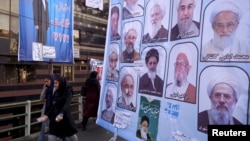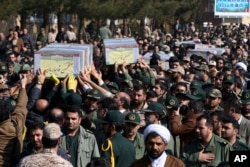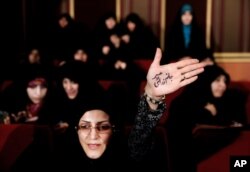As Iranians go to the polls Friday in parliamentary elections, some voters will pass giant murals where Iran’s rising casualties in Syria’s war are publicized.
But Tehran’s deepening involvement in Syria has largely not been a campaign issue. Candidates have not mentioned the topic, except for a few in the conservative camp who have praised Iran’s sacrifice in the war, especially in targeting the Islamic State group.
Iran’s hard-line regime is making sure the human cost Iran is paying in Syria does not become a domestic election concern, analysts and rights activists say.
“Iranian authorities have engineered public opinion in a way that if we do not fight IS abroad, Iran will fall apart and will experience a similar scene as Syria,” Ahmad Farahani, an Iranian journalist in exile in Copenhagen, told VOA.
In public comments and in the government-run media, the Iranian regime says it has teamed with Russia to support the Syrian regime of Bashar al-Assad against opposition rebels and IS.
Tehran has sent its elite Revolutionary Guard Corps (IRGC) to fight ground battles, joining with Iranian-backed Hezbollah fighters from Lebanon. They are backed by Russian air support.
Larger force
Analysts say the number of IRGC and Hezbollah fighters in Syria grew substantially last year, and casualties among them have mounted.
Tehran reportedly increased the number of IRGC personnel in Syria in the final months of 2015, sending as many as 3,500 militia fighters to the front lines to defend Zeinab Shrine, a holy site for Shi’ite Muslims in the southern suburbs of Damascus.
In a recent interview with Iran’s state-run IRIB TV2 channel, the IRGC’s deputy commander, Brigadier General Hossein Salami, said the number of Iranian casualties in Syria had increased as a result of an escalation in fighting.
The Iranian regime portrayed the deaths as part of a great sacrifice in the fight against IS and its threat of a spreading caliphate.
The Iranian “fight in Syria is a fight against IS,” a media researcher at the Bureau of Media Studies in Tehran told VOA, speaking on the condition of anonymity. “This is all what most Iranians know about the fight in Syria. Support for Bashar is truly secondary.”
Public's support
The IS threat does not let Iranians oppose their country’s involvement in the Syrian war, analysts say.
“With over 89 percent national approval on Iran’s involvement in the Syrian war, according to a recent survey conducted by the University of Maryland, the Iranian regime feels confident of its Syrian policy,” said Ebrahim Mohseni, a research scholar at the University of Maryland. “Two in three Iranians support Iran sending military personnel to Syria to fight IS.”
In Isfahan, one of Iran's major cities, a conservative camp demands in campaign posters to know whether voters believe reformers can stand up to IS.
“If IS cannot be contained through someone else’s blood alone, it is better for us to fight it in someone else’s land, not ours,” Mohseni said.
That logic goes with the Iranian regime’s dedication to protecting Iran from “foreign enemies,” analysts say.
“The Iranian authorities well-defined their legitimacy by stating the threats coming from ‘the enemy,’ a term that high-ranking officials use to name the United States,” said Ali Akbar Mousavi Khoeini, a former member of the Iranian parliament.
Could policy backfire?
But Iranian leaders are running a risk of their war policy turning against them, analysts say. As casualties mount, more Iranians seem to question Tehran’s involvement in the Syrian war, they say.
Public funerals are on the rise, and some memorials have been erected in some cities commemorating the fallen ones.
“This must raise public concern and become a major debate in elections in a healthy society, by all means,” said Javad Nateghpour, a U.K.-based sociology scholar and expert on Iranian life. “Iran has turned into a polarized society now. Some zealous supporters of the supreme leader have made it a mission of their life to say yes to whatever he suggests, and the rest feel alienated.
“Most people believe that the ones who go to war in Syria are either so gung-ho for [the supreme leader] and the ideology or are being compensated for the service they offer,” he said.
If the elections yield a reformist majority, considered unlikely, Iranian involvement in Syria could be challenged, analysts say.
“A reformist parliament will clearly support dialogue in the international arena and prefer negotiation to confrontation,” said Ali Afshari, a Washington-based analyst of Iranian affairs.













